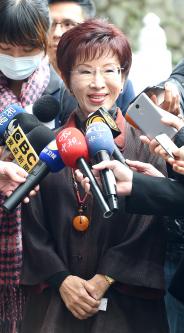Taiwan’s future lies in China: Hung Hsiu-chu
By Alison Hsiao / Staff reporter
Taiwan’s future lies in China, Chinese Nationalist Party (KMT) Chairwoman Hung Hsiu-chu (洪秀柱) said yesterday, while reiterating that the People’s Republic of China (PRC) and the Republic of China (ROC) are “not two countries.”
Hung made the remarks in a speech at Ming Chuan University in Taipei, where she talked about her life and views on “the nation and the world.”
She told her young audience not to impose restrictions in their life, work hard whatever job they are in and seek to create their own opportunities.
She also warned them against being captivated by power and losing themselves when in power.
During the question-and-answer session, several Chinese students expressed their affection for Hung and asked her about issues ranging from cross-strait relations to the KMT’s prospects.
When a Chinese student complimented Hung for “promoting unification,” Hung jokingly said: “Don’t you try to get me framed (你不要害死我),” but then added that while many have tried to label her as “red,” she said she is “not afraid.”
Few people “really understand the [ROC] Constitution, the Act Governing Relations Between the People of the Taiwan Area and the Mainland Area (臺灣地區與大陸地區人民關係條例) and the ‘1992 consensus’; if they do, they would know how cross-strait policy should be developed,” she added.
While praising former president Ma Ying-jeou (馬英九) for maintaining the “status quo” during his eight years in office based on “mutual non-recognition of sovereignty,” “mutual non-denial of governing power,” and the promise of “no unification, no independence and no use of force,” Hung said it is not possible for Taiwan not to move forward forever.
“The reality is [Beijing] believes its sovereignty claim covers Taiwan, and Taiwan vice versa, so the sovereignty claims of the two sides actually overlap,” she said, calling for mutual recognition of governance and a step forward toward political negotiations rather than restricting cross-strait talks to economy-related matters.
The new KMT policy platform that was passed by the party’s national congress in September, which called for enhancing the so-called “1992 consensus” and exploring the possibility of ending cross-strait hostilities by signing a peace accord, is a step in this direction, she said.
However, the new policy platform has sparked controversy even within the party, with senior KMT members, including KMT Vice Chairman Hau Lung-bing (郝龍斌) and former vice president Wu Den-yih (吳敦義), expressing their opposition to the changes.
Hung yesterday reiterated that the ROC Constitution refers to “one China” and the “1992 consensus” is “none other than a cross-strait effort to pursue unification,” but with the two sides differing in their interpretations of how it should be achieved.
When a Taiwanese student referred to the ROC and the PRC as “two countries” in his question, Hung interrupted him by saying: “[They are] not two countries.”
When the student asked about her long-term view on cross-strait relations, “whether it would be [Taiwanese] independence, unification or maintaining the ‘status quo,’” Hung said it would either be unification or unification by force.
The future of Taiwan lies in China, the second largest economy in the world, she said.
“While we can no longer retake the mainland, Taiwan can exert its influence [over China] and change its institution,” she said.
Prior to the event, Hung was asked to comment on KMT caucus convener Sufin Siluko’s (廖國棟) remarks on Thursday that he feared the KMT would become more like the “New Party” should Hung be re-elected chairperson.
Hung told reporters that since she became KMT chairperson, the party has not seen a drop-off in membership, but instead, more people wanting to become members.
She also took issue with KMT Legislator Lai Shyh-bao’s (賴士葆) call for a series of policy debates among chairperson aspirants before the end of next month, saying time should be allowed for preparation.
Additional Reporting by CNA

No comments:
Post a Comment